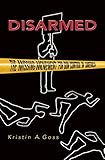Disarmed : The Missing Movement for Gun Control in America / Kristin Goss.
Material type: TextSeries: Princeton Studies in American Politics: Historical, International, and Comparative Perspectives ; 120Publisher: Princeton, NJ : Princeton University Press, [2010]Copyright date: ©2006Edition: Course BookDescription: 1 online resource (312 p.) : 9 line illus. 8 tablesContent type:
TextSeries: Princeton Studies in American Politics: Historical, International, and Comparative Perspectives ; 120Publisher: Princeton, NJ : Princeton University Press, [2010]Copyright date: ©2006Edition: Course BookDescription: 1 online resource (312 p.) : 9 line illus. 8 tablesContent type: - 9780691138329
- 9781400837755
- 363.330973
- HV7436
- online - DeGruyter
- Issued also in print.
| Item type | Current library | Call number | URL | Status | Notes | Barcode | |
|---|---|---|---|---|---|---|---|
 eBook
eBook
|
Biblioteca "Angelicum" Pont. Univ. S.Tommaso d'Aquino Nuvola online | online - DeGruyter (Browse shelf(Opens below)) | Online access | Not for loan (Accesso limitato) | Accesso per gli utenti autorizzati / Access for authorized users | (dgr)9781400837755 |
Frontmatter -- Contents -- List of Figures -- List of Tables -- Acknowledgments -- CHAPTER ONE. The Gun Control (Participation) Paradox -- CHAPTER TWO. A Movement in Theory -- CHAPTER THREE. Socializing Costs: Patronage and Political Participation -- CHAPTER FOUR. Personalizing Benefits: Issue Frames and Political Participation -- CHAPTER FIVE. Changing the Calculation: Policy Incrementalism and Political Participation -- CHAPTER SIX. Mobilizing around Modest Measures: Three Cases -- CHAPTER SEVEN. Conclusion: Politics, Participation, and Public Goods -- Appendix A: Gun-Related Trends -- Appendix B: Brief Case Studies of Other Social-Reform Movements -- Appendix C: Survey of Million Mom March Participants -- Notes -- References -- Index
restricted access online access with authorization star
http://purl.org/coar/access_right/c_16ec
More than any other advanced industrial democracy, the United States is besieged by firearms violence. Each year, some 30,000 people die by gunfire. Over the course of its history, the nation has witnessed the murders of beloved public figures; massacres in workplaces and schools; and epidemics of gun violence that terrorize neighborhoods and claim tens of thousands of lives. Commanding majorities of Americans voice support for stricter controls on firearms. Yet they have never mounted a true national movement for gun control. Why? Disarmed unravels this paradox. Based on historical archives, interviews, and original survey evidence, Kristin Goss suggests that the gun control campaign has been stymied by a combination of factors, including the inability to secure patronage resources, the difficulties in articulating a message that would resonate with supporters, and strategic decisions made in the name of effective policy. The power of the so-called gun lobby has played an important role in hobbling the gun-control campaign, but that is not the entire story. Instead of pursuing a strategy of incremental change on the local and state levels, gun control advocates have sought national policies. Some 40% of state gun control laws predate the 1970s, and the gun lobby has systematically weakened even these longstanding restrictions. A compelling and engagingly written look at one of America's most divisive political issues, Disarmed illuminates the organizational, historical, and policy-related factors that constrain mass mobilization, and brings into sharp relief the agonizing dilemmas faced by advocates of gun control and other issues in the United States.
Issued also in print.
Mode of access: Internet via World Wide Web.
In English.
Description based on online resource; title from PDF title page (publisher's Web site, viewed 30. Aug 2021)


